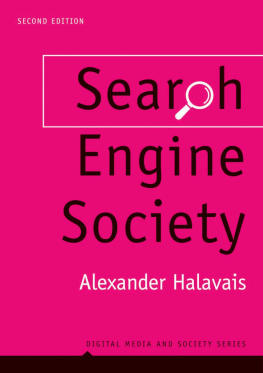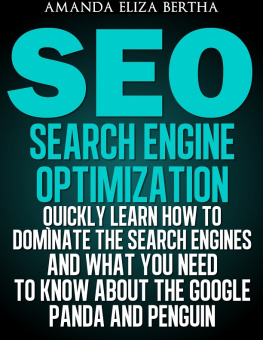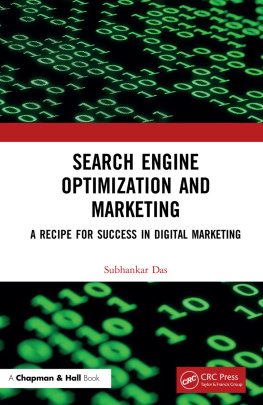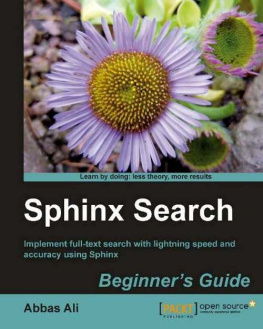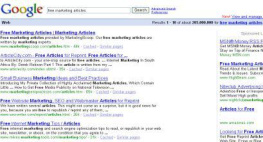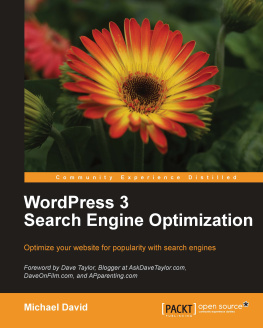Halavais - Search Engine Society
Here you can read online Halavais - Search Engine Society full text of the book (entire story) in english for free. Download pdf and epub, get meaning, cover and reviews about this ebook. City: Cambridge;England;Medford;Massachusetts, year: 2018;2017, publisher: Polity Press, genre: Politics. Description of the work, (preface) as well as reviews are available. Best literature library LitArk.com created for fans of good reading and offers a wide selection of genres:
Romance novel
Science fiction
Adventure
Detective
Science
History
Home and family
Prose
Art
Politics
Computer
Non-fiction
Religion
Business
Children
Humor
Choose a favorite category and find really read worthwhile books. Enjoy immersion in the world of imagination, feel the emotions of the characters or learn something new for yourself, make an fascinating discovery.
- Book:Search Engine Society
- Author:
- Publisher:Polity Press
- Genre:
- Year:2018;2017
- City:Cambridge;England;Medford;Massachusetts
- Rating:5 / 5
- Favourites:Add to favourites
- Your mark:
- 100
- 1
- 2
- 3
- 4
- 5
Search Engine Society: summary, description and annotation
We offer to read an annotation, description, summary or preface (depends on what the author of the book "Search Engine Society" wrote himself). If you haven't found the necessary information about the book — write in the comments, we will try to find it.
Search Engine Society — read online for free the complete book (whole text) full work
Below is the text of the book, divided by pages. System saving the place of the last page read, allows you to conveniently read the book "Search Engine Society" online for free, without having to search again every time where you left off. Put a bookmark, and you can go to the page where you finished reading at any time.
Font size:
Interval:
Bookmark:

Digital Media and Society Series
Nancy Baym, Personal Connections in the Digital Age, 2nd edition
Mercedes Bunz and Graham Meikle, The Internet of Things
Jean Burgess and Joshua Green, YouTube
Mark Deuze, Media Work
Andrew Dubber, Radio in the Digital Age
Charles Ess, Digital Media Ethics, 2nd edition
Jordan Frith, Smartphones as Locative Media
Alexander Halavais, Search Engine Society, 2nd edition
Martin Hand, Ubiquitous Photography
Robert Hassan, The Information Society
Tim Jordan, Hacking
Graeme Kirkpatrick, Computer Games and the Social Imaginary
Leah A. Lievrouw, Alternative and Activist New Media
Rich Ling and Jonathan Donner, Mobile Communication
Donald Matheson and Stuart Allan, Digital War Reporting
Dhiraj Murthy, Twitter, 2nd edition
Zizi A. Papacharissi, A Private Sphere: Democracy in a Digital Age
Jill Walker Rettberg, Blogging, 2nd edition
Patrik Wikstrm, The Music Industry, 2nd edition
ALEXANDER HALAVAIS
polity
Copyright Alexander Halavais 2018
The right of Alexander Halavais to be identified as Author of this Work has been asserted in accordance with the UK Copyright, Designs and Patents Act 1988.
First edition published in 2008 by Polity Press
This edition first published in 2018 by Polity Press
Polity Press
65 Bridge Street
Cambridge CB2 1UR, UK
Polity Press
101 Station Landing, Suite 300
Medford, MA 02155, USA
All rights reserved. Except for the quotation of short passages for the purpose of criticism and review, no part of this publication may be reproduced, stored in a retrieval system, or transmitted, in any form or by any means, electronic, mechanical, photocopying, recording, or otherwise, without the prior permission of the publisher.
ISBN-13: 978-1-5095-1686-5
A catalogue record for this book is available from the British Library.
Names: Halavais, Alexander M. Campbell, author.
Title: Search engine society / Alexander Halavais.
Description: Second edition. | Cambridge, UK ; Medford, MA : Polity Press, [2017] | Series: Digital media and society | Includes bibliographical references and index.
Identifiers: LCCN 2017024677 (print) | LCCN 2017037380 (ebook) | ISBN 9781509516858 (Mobi) | ISBN 9781509516865 (Epub) | ISBN 9781509516827 (hardback) | ISBN 9781509516834 (pbk.)
Subjects: LCSH: Web search engines--Social aspects. | Information technology--Social aspects.
Classification: LCC HM851 (ebook) | LCC HM851 .H343 2017 (print) | DDC 303.48/33--dc23
LC record available at https://lccn.loc.gov/2017024677
The publisher has used its best endeavors to ensure that the URLs for external websites referred to in this book are correct and active at the time of going to press. However, the publisher has no responsibility for the websites and can make no guarantee that a site will remain live or that the content is or will remain appropriate.
Every effort has been made to trace all copyright holders, but if any have been inadvertently overlooked the publisher will be pleased to include any necessary credits in any subsequent reprint or edition.
For further information on Polity, visit our website: politybooks.com
In 2016, German Chancellor Angela Merkel raised an alarm about the influence of search on the web: Algorithms, when they are not transparent, can lead to a distortion of our perception, they can shrink our expanse of information (Connolly 2016). While there have, over time, been many criticisms of the effect of search engines on society, this brings us to the very point of many of them: search reduces the amount of information available to us, and in doing so introduces bias.
Perhaps you come to this book wondering whether search engines are biased. They are. It would be impossible for them to be otherwise. Indeed, that is their intended function. A perfect mirror, reflecting the web and other knowledge spaces precisely, would serve little purpose. We want search engines to act as a filter, removing the less important stuff, so that we can apply our naturally limited attention to what really matters.
Matters to whom? That is perhaps the most important question we can ask about how search has changed our social lives. Over nearly a decade since the first edition of this book was published, a new focus has emerged around questions of algorithmic culture, on the power of hidden processes that shape our information space, and how economic and political relations are encoded into platforms and networks. Naturally, these questions have existed much longer, and have often been central to the study of large sociotechnical systems for decades, but the rapid integration of the internet into the everyday lives of most of the planets population has given new rise to questions of how these often invisible biases might be affecting what it is to be a human of the twenty-first century.
Search engines and social platforms have quietly been at the forefront of algorithmic culture, reshaping the web, and, by extension, much of the way in which we interact with one another. No one has missed the rise of the largest search engine company, Google, as one of the new economic powerhouses of the last few decades. But the focus has largely been on the ways in which Google has profited from advertising, or its seeming growth into a company that provides everything from education to automobiles, rather than the core technology that drove its growth. The search engine seems so unassuming, working quietly in the background, changing the structure of our lives.
Take a moment and type the following search string into your favorite search engine: Google is your friend. Today, the number of hits for that phrase on Google stands at about 882,000. The company is successful, but who knew it was so friendly? Even the abbreviation of the phrase GIYF receives over 100,000 hits. If you have picked up this book, you can probably guess the context in which this phrase is used. If not, a description may be found at justfuckinggoog leit.com, which reads, in part:
Google Is Your Friend
All Smart People Use Google
It Appears That You Are Not One Of Them
The search engine has become so much a part of our culture that there is a common assumption that we have found a cure for stupid questions. Folded into that assumption, we find a host of others: that even the unintelligent have access to and can use a search engine, that a search engine will lead someone to a page that contains accurate information, and that questions are best directed first to a machine.
Unpacking the black box of the search engine is something of interest not only to technologists and marketers, but to anyone who wants to understand how we make sense of a newly networked world. Search engines and social platforms have come to play a central role in corralling and controlling the ever-growing sea of information that is available to us, and yet they are trusted more readily than they ought to be. They freely provide, it seems, a sorting of the wheat from the chaff, and answer our most profound and most trivial questions. They have become an object of faith.
We ask many things of search engines what do they ask in return? Search engines are at once the most and the least visible part of the digital, networked revolution. The modern search engine has taken on the mantle of what the ancients of many cultures thought of as an oracle: a source of knowledge about our world and who we are. Children growing up in the twenty-first century have only ever known a world in which search engines could be queried, and almost always provide some kind of an answer, even if it may not be the best one.
Font size:
Interval:
Bookmark:
Similar books «Search Engine Society»
Look at similar books to Search Engine Society. We have selected literature similar in name and meaning in the hope of providing readers with more options to find new, interesting, not yet read works.
Discussion, reviews of the book Search Engine Society and just readers' own opinions. Leave your comments, write what you think about the work, its meaning or the main characters. Specify what exactly you liked and what you didn't like, and why you think so.

